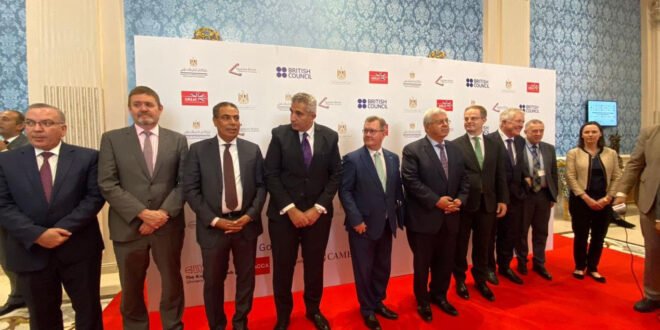British Council launched a new British Council report identifies Egypt as an important and growing market for
transnational education (TNE) with the UK being the largest provider, and the US and
Germany also increasingly active in the market.
The report identifies an operating environment that is positive and enabling but warns
UK universities to be diligent as regulations and procedures governing international education
in Egypt vary depending on the TNE delivery model.
The report was launched during an UK Universities Mission Opening event attended
by H.E. Dr. Ayman Ashour, Egyptian Minister of Higher Education and Scientific Research.
Four International branch campus hubs, hosting seven universities (including four from the UK),
have been developed since 2018 with the Egyptian government keen to attract more.
The UK has more higher education partnerships
in Egypt than any other country
and Egypt is the UK’s largest TNE market in the region;
however, recent growth has been driven by Germany and the US.
According to the report, Egypt’s current socio-demographic context and large youth population
means that demand for quality higher education remains high.
With overseas education fees often regarded as prohibitively expensive for local families,
TNE represent an attractive lower cost option for many.
While Egypt boasts streamlined systems and supportive regulations related to the
establishment of international branch campuses (IBCs),
foreign universities must also create business and/or legal partnerships with local investors.
Though these procedures can be expedited via local consultants, processes remain complex.
The report identifies IBCs as the preferred model for Egyptian policy makers, with bilateral
collaborative provision such as joint or dual degrees generally considered as
inter-university business by Egyptian regulatory bodies.
Undertaken between February and May 2023,
the research contained in the report gathers insights from UK and Egyptian
stakeholders including university representatives, students, policymakers, consultants and investors.
To give UK universities greater confidence in the Egyptian market, the
report recommends increased transparency of policies, regulations, and processes.
The report also recommends for more to be done to catalogue and demonstrate
the benefits of the IBC model to UK universities.
Speaking about the report;
His Excellency the Minister of Higher Education and Scientific Research, Prof. Dr. Ayman Ashour said:
“His Excellency the Minister of Higher Education and Scientific Research, Prof. Dr. Ayman Ashour said:
Higher Education in Egypt is witnessing remarkable development, owing to the
extensive support of HE President Abdel Fattah El-Sisi, and the tireless efforts
exerted by the Ministry of Higher Education and Scientific Research to improve the quality of higher education in
Egypt and ensure its advancement.
I would also like to highlight the Ministry’s endeavours to meet international
standards and establish stronger partnerships with international
universities while emphasising our academic cooperation with the United Kingdom,
which represents one of our priorities for developing the quality of education in Egypt.
The Ministry also seeks to make Egypt a centre for international education,
making the most of its strategic location as a bridge between the Middle East, North Africa,
and Sub-Saharan Africa, and a promising market for international education and research..”
British Council Country Director for Egypt Mark Howard said;
“This report sheds light on the tremendous partnership opportunities
that exist between UK and Egyptian universities – including international
branch campuses, joint and dual degrees and other TNE delivery models. People in
Egypt generally hold British higher education in high regard,
and it’s great to see the government support efforts to
serve this appetite for top quality international education.”
John McNamara, Global Research Manager, Education Insight Hubs,
British Council, who is one of the reports lead authors, said:
“While Egypt is one of the UK’s top TNE markets,
the process for developing different TNE partnership models is not always clearly understood.
We hope that this report provides practical guidance and experience-based insight into the steps to take,
and stakeholders to engage with, to support sustainable UK and Egyptian education partnerships,
as Egypt continues to emerge as a major regional player in TNE

 التكنولوجيا وأخبارها بوابة مصر لأخبار تكنولوجيا المعلومات والإتصالات وفي أفريقيا كما تعتبر مصدر رئيسي للمعلومات حول تكنولوجيا المعلومات والاتصالات والفرص الاستثمارية المرتبطة بالاقتصاد الرقمي في المنطقة بالكامل
التكنولوجيا وأخبارها بوابة مصر لأخبار تكنولوجيا المعلومات والإتصالات وفي أفريقيا كما تعتبر مصدر رئيسي للمعلومات حول تكنولوجيا المعلومات والاتصالات والفرص الاستثمارية المرتبطة بالاقتصاد الرقمي في المنطقة بالكامل







